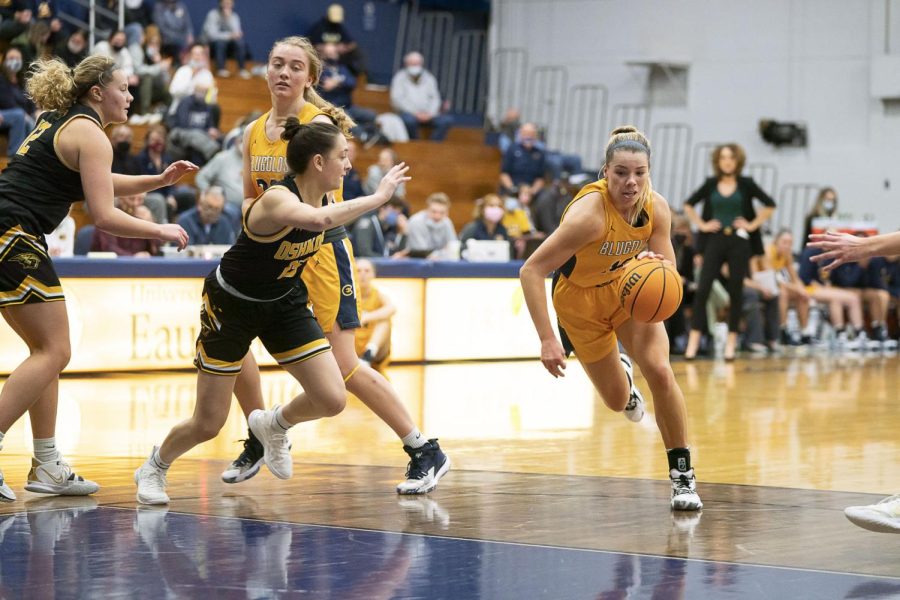Eating pizza and cheeseburgers, doing homework, playing “nose goes” and living in a dorm are some day-to-day things most students at UW-Eau Claire experience and expect. But for some Blugolds, it has been an adjustment or unfamiliar territory.
Walking among the Blugolds from all around the United States are 216 international students from 34 different countries.
Coming from a different culture and having to learn a new one could create some confusion and getting used to, but just how challenging is it for international students to adjust?
Maria Carvalho, international student advisor at the Center for International Education at Eau Claire, said some students arrive at Eau Claire and can be completely comfortable, while others have a more difficult time and have to work through it.
Shock
For Noor Al Bayat, of Saudi Arabia, Eau Claire’s atmosphere came as a bit of a shock after she arrived in the summer of 2012.
“Last semester I had culture shock, I was crying all the time, I didn’t understand anything, I hated myself,” she said. “I called my family all the time and finally I adjusted.”
Al Bayat said her shock was a result of not feeling at home. Her home campus in Saudi Arabia separates male and females, so she was not used to the integration at Eau Claire.
Talita Lomba Silva, of Brazil, said she is still adjusting to life in America even though she has been in the country since January 2010.
“I love it here because of the quality of life and all the opportunities, but the way people interact with each other is completely different,” Lomba Silva said.
In Brazil, she said people are warm and welcoming but she somehow senses a barrier in America.
“Americans tend to have a bigger personal bubble and they just have this different way to communicate,” she said. “I guess I have a hard time explaining it because it is more of how I feel in certain situations then specific things they do.”
School System
In addition to her adjustment to Eau Claire, homework played a part in Al Bayat’s culture shock. She said she doesn’t have homework at her university.
Yasha Aakesson, a junior business major from Sweden, also said her home campus does not assign homework and the school system is quite different.
“This feels like going back to high school for me because (in college) we don’t have a schedule at all,” Aakesson said.
She said in Sweden, she would take one class at a time for about one and a half months, take an exam and then move on to another class.
Independence
Yiwen Wu, a freshman from China, said he sees a lot of independence in the American students. He said Chinese students are often in a group, but he sees more American students sitting at a table eating or reading by themselves at times.
Hanning Chen, a senior from Beijing, said he did not have much independence before coming to study in America.
“Before I came to the U.S., my parents had to prepare almost everything ready for me,” Chen said.
He said he would associate the lack of independence in Chinese children because of the one-child policy there. The policy was introduced in 1979 in an effort to slow the rising growth in population, so families can be fined thousands of dollars if they have more than one child.
Language
Language is one of the two most common things Carvalho said she sees international students have difficult time adjusting to.
Chen said the hardest part for him to get used to is the language. However, he began to learn a lot the more time he spent in America. He learned the phrase “What’s up?” and now he uses the expression every time he goes back to his dorm room and talks to his roommate.
Wu said the language was difficult for him as well because Chinese and English are so different.
“Not because of just the grammar, but the whole thing,” Wu said. “We use symbols and (Americans) just use 26 letters to make up the whole thing.”
Al Bayat said her English was not great when she first arrived and it played a big role in her culture shock during her first semester.
“I’m not used to being in an environment like here,” she said. “I didn’t speak too much, my language was a little horrible and I didn’t have the confidence in myself, but at the end of the semester I started to speak good and now very fluent.”
In order to improve her language skills, Al Bayat would meet with a conversation partner each week, which is something the ESL program required her to do. She and her partner would meet and have an organized conversation which would allow her to better her English.
But for Aakesson, the language was a fairly easy part of adjustment even when it came to slang.
“I think we are kind of used to slang words because we have so many English in American TV shows that we all have watched since we were kids,” she said.
Aakesson used to watch shows like the “Fresh Prince of Bel Air,” “Friends,” “Spin City” and “Sabrina the Teenage Witch.” But that doesn’t mean she is never confused either.
She said she was in class when one of her classmates played “nose goes” by putting her pointer finger on her nose.
“I had no idea what that was,” she said. “I was like what are you doing?”
Food
High calorie is how Wu would describe the food in America.
“I have been eating American food for almost one year, so I am getting fat,” he said.
He said the food is quite different from what he is used to in China and although the cafeteria on upper campus has American Chinese food, he said he doesn’t get food from there because “that is not really good.”
Food was the second most common adjustment Carvalho said she sees international students have trouble with because a lot of the food that is readily available in Eau Claire is not something they are used to.
Lomba Silva said the food is one of the things she misses the most in Brazil. She said she is used to so much fresh food and everyone eats lots of grains, beans, salad, vegetables and fruits.
“Here so much of the food is processed and has all these nasty things like corn syrup and tons of salt,” she said. “I don’t even think we use corn syrup back in Brazil.”
One thing that still shocks her is how almost anything can be bought pre-made.
Benefits
Although Al Bayat had a rough start when she first arrived at Eau Claire, she said she really likes it here. She said the students have so much opportunity from being able to rent technology from the library to going on field trips through classes. She said she is very appreciative of the professors, students and friends she has been able to meet.
Aakesson said she is really happy she took the opportunity to study in America because she has learned so much from the culture and she has been able to make friends from all around the world.
“So I think it’s a good way to make contacts and networking around the world and also being able to improve your English,” Aakesson said.
Carvalho said the international students bring a lot of different perspectives, backgrounds and experiences to the university which is valuable to the students on campus as well as the community.
“We want to bring our students to the world and also the world to our students.”





